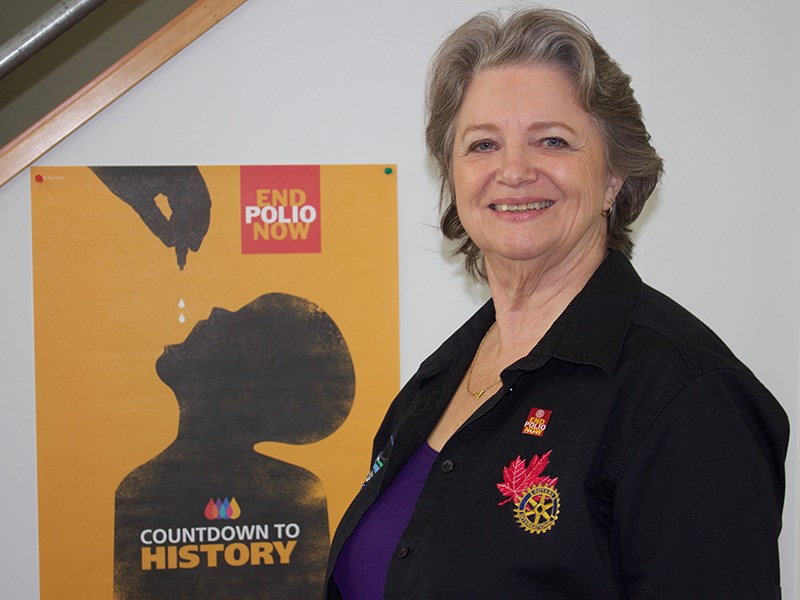As long as polio exists, Rotary International will continue to fundraise for the worldwide eradication of the infectious disease. Rotary Club of Powell River is part of the international campaign and will host its annual Purple 4 Polio Dinner on Tuesday, November 28.
“I hope residents of our community attend this very worthwhile event,” said Rotary club president Scott Randolph. “We have an amazing speaker lined up, New Westminster Rotarian Gabor Gasztonyi, who has participated in countless immunization campaigns overseas and has a very interesting perspective on delivering care to those who have been crippled by this devastating disease.”
Last year, the dinner raised $2,200, which was matched two-to-one by the Government of Canada and the Bill and Melinda Gates Foundation for a total of $11,000.
“It’s amazing to think of the partnerships Rotary International has developed in its quest to eradicate polio: the Gates Foundation, UNICEF, the World Health Organization (WHO) and US Centers for Disease Control,” said Randolph. “It’s because of these partnerships and generous support of Rotarians and the general public that we are so close to achieving our goal.”
Rotary International chose the colour purple as a symbol of its participation in the campaign to wipe out polio because the finger of a child who had been vaccinated used to be marked with purple dye.
Not long ago, well within memory of the baby boomers generation, polio swept across Canada in four separate waves, infecting mostly children. People lived in fear and victims were quarantined because the disease was thought to be spread by mere touch.
Only when American medical researcher Jonas Salk created one of the first successful polio vaccines was there hope the disease could be treated.
According to the WHO, only three countries currently remain where transmission has not been stopped: Afghanistan, Pakistan and Nigeria. Canada has been polio free for 20 years.
Almost 9,000 cases and 500 deaths were recorded when the biggest polio outbreak swept through the country in 1953, according to the Canadian Public Health Association. One of the survivors of that wave was local Rotary director Jan Gisborne.
“I was a year and a half old,” said Gisborne. “By the time they figured out why I wouldn't move my arms, I was already getting better. The doctor came and said, ‘I think she has polio.’ Within a week I was recovered and I have no long-term effects.”
Prior to the Salk discovery, tens of thousands of Canadian children and adults became infected. Some were left with crippling paralysis and fitted with painful braces. Rows and rows of iron lungs filled hospital wards at the height of the mid-century outbreaks and were used to treat an infection that paralyzed the respiratory system.
In the 1940s and 1950s, when the worldwide infection rate was at its highest, polio killed or paralyzed more than half a million people, according to the WHO.
Fear during those peak years gave rise to public reaction that led to new medicines, mobilization of massive public-health immunization campaigns and a change in medical philanthropy.
According to the WHO, as long as a single child remains infected, children everywhere remain at risk.
Gisborne was a member of international immunization programs in India in 2004, where a case has not been reported in three years, and in Nigeria in 2007. In both countries, Gisborne said she encountered opposition to immunization.
Gisborne said a mistrust of the government and health-care workers in India was due in part to a lack of education and actions by the Central Intelligence Agency when it organized fake vaccination campaigns as a tactic in its hunt for Osama bin Laden.
“That led to a deep mistrust of vaccination in India,” said Gisborne. “That set us back years.”
Next year, the hope is that polio will completely eradicated worldwide.
“I think by the end of 2018 we will see our last case,” said Gisborne. “When it's finished, we can stop immunizing for polio and focus on other things.”
Tickets for Purple 4 Polio Dinner at ARC Community Event Centre are available for $50 at the Peak or by calling 604.485.5935 or 604.485.4770.



